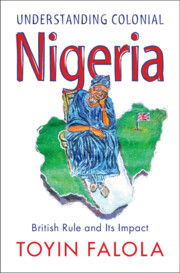Book contents
- Understanding Colonial Nigeria
- Understanding Colonial Nigeria
- Copyright page
- Dedication
- Contents
- Figures
- Maps
- Preface
- Acknowledgments
- Timeline of Events
- Part I Introduction
- Part II Conquest and Colonization
- Part III Colonial Societies
- Part IV Nationalism and Independence
- Part V Conclusion
- Bibliography
- Index
- References
Bibliography
Published online by Cambridge University Press: 21 November 2024
- Understanding Colonial Nigeria
- Understanding Colonial Nigeria
- Copyright page
- Dedication
- Contents
- Figures
- Maps
- Preface
- Acknowledgments
- Timeline of Events
- Part I Introduction
- Part II Conquest and Colonization
- Part III Colonial Societies
- Part IV Nationalism and Independence
- Part V Conclusion
- Bibliography
- Index
- References
- Type
- Chapter
- Information
- Understanding Colonial NigeriaBritish Rule and Its Impact, pp. 593 - 682Publisher: Cambridge University PressPrint publication year: 2024

